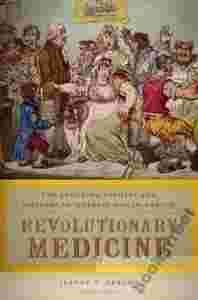|
Before the advent of modern antibiotics, one's life
could be abruptly shattered by contagion and death, and
debility from infectious diseases and epidemics was
commonplace for early Americans, regardless of social
status. Concerns over health affected the founding
fathers and their families as it did slaves, merchants,
immigrants, and everyone else in North America. As both
victims of illness and national leaders, the Founders
occupied a unique position regarding the development of
public health in America. Revolutionary Medicine
refocuses the study of the lives of George and Martha
Washington, Benjamin Franklin, Thomas Jefferson, John
and Abigail Adams, and James and Dolley Madison away
from the usual lens of politics to the unique
perspective of sickness, health, and medicine in their
era. For the founders, republican ideals fostered a
reciprocal connection between individual health and the
"health" of the nation. Studying the encounters of these
American founders with illness and disease, as well as
their viewpoints about good health, not only provides us
with a richer and more nuanced insight into their lives,
but also opens a window into the practice of medicine in
the eighteenth century, which is at once intimate,
personal, and first hand. Perhaps most importantly,
today's American public health initiatives have their
roots in the work of America's founders, for they
recognized early on that government had compelling
reasons to shoulder some new responsibilities with
respect to ensuring the health and well-being of its
citizenry. The state of medicine and public healthcare
today is still a work in progress, but these founders
played a significant role in beginning the conversation
that shaped the contours of its development. Jeanne E.
Abrams is Professor at Penrose Library and the Center
for Judaic Studies at the University of Denver. She is
the author of Jewish Women Pioneering the Frontier
Trail: A History in the American West (NYU Press 2006)
and Dr. Charles David Spivak: A Jewish Immigrant and the
American Tuberculosis Movement, as well as numerous
articles in the fields of American, Jewish and medical
history which have appeared in scholarly journals and
popular magazines.
|
|

